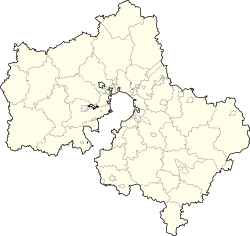Zaraysk
| Zaraysk (English) Зарайск (Russian) |
|
|---|---|
| - Town - | |
 Gostiny Dvor in Zaraysk |
|
 Location of Moscow Oblast in Russia |
|
|
|
|
|
|
|
|
|
|
| Administrative status (as of September 2013) | |
| Country | Russia |
| Federal subject | Moscow Oblast |
| Administrative district | Zaraysky District |
| Town | Zaraysk |
| Administrative center of | Zaraysky District, Town of Zaraysk |
| Municipal status (as of November 2010) | |
| Municipal district | Zaraysky Municipal District |
| Urban settlement | Zaraysk Urban Settlement |
| Administrative center of | Zaraysky Municipal District, Zaraysk Urban Settlement |
| Representative body | Council of Deputies |
| Statistics | |
| Area | 20.5 km2 (7.9 sq mi) |
| Population (2010 Census) | 24,645 inhabitants |
| Density | 1,202/km2 (3,110/sq mi) |
| Time zone | MSK (UTC+03:00) |
| First mentioned | 1146 |
| Town status since | 1778 |
| Postal code(s) | 140600–140603 |
| Dialing code(s) | +7 49666 |
|
|
|
| on | |
Zaraysk (Russian: Зара́йск) is a town and the administrative center of Zaraysky District in Moscow Oblast, Russia, located about 162 kilometers (101 mi) southeast from Moscow. Population: 24,645 (2010 Census);25,093 (2002 Census);26,958 (1989 Census).
The town stands on the right bank of the Osyotr River, which is a right confluent of the Oka.
In the Middle Ages, the town belonged to the Princes of Ryazan and was known as Krasnoye (13th century) and Novogorodok-upon-the-Osyotr (14th and 15th centuries). From 1528 onwards, the town was called "the town of Nikola Zarazsky" and only by the beginning of 17th century it received its present name of Zaraysk. Before the 20th century, the town was a part of Ryazan Governorate and its architecture and vernacular dialect seem closer to Ryazan than to Moscow.
In the Grand Duchy of Moscow, Zaraysk was one of the fortresses forming a part of the Great Abatis Border, a fortified line of felled trees, barricades, fortresses, ditches, which were built by Russians as a protection against the hordes of the Crimean and Kazan Tatars. In 1531, a stone kremlin was built in place of the former wooden citadel. The Tatars failed to take the fortress during their raids in 1533, 1541, and 1570. It was briefly captured by the Lisowczycy during the Time of Troubles.
...
Wikipedia


